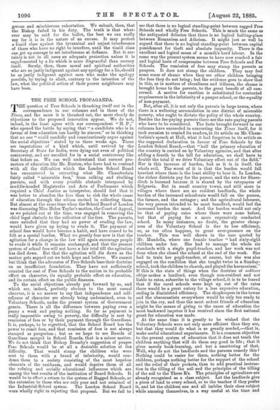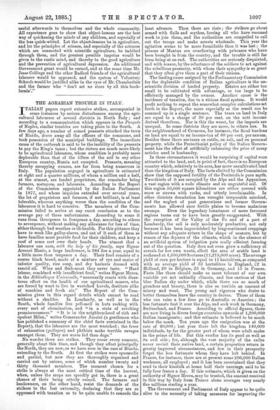THE FREE SCHOOL PROPAGANDA.
THE question of Free Schools is thrashing itself out in the correspondence in our columns and in those of the Times, and the more it is thrashed out, the more clearly do objections to the proposed innovation appear. We do not, indeed, in the least agree with our correspondent " H. P.," who opened the battle by saying that " a candidate who is in favour of free education can hardly be sincere," or in thinking that no one " could candidly and conscientiously argue against the social objections " stated by us three weeks ago. These are imputations of a kind which, until revived by the Secretary of State for India, were dying out even of political controversy, and are uncalled for in a social controversy like that before us. We can well understand that earnest pro- moters of education like Mr. Buxton, who have had to contend with all the difficulties which the London School Board has encountered in extracting what Mr. Chamberlain fairly called " miserable fees," from sulking and skulking parents, and with every possible obstacle interposed by muddle-headed Magistrates and Acts of Parliament which required a Chief Justice as interpreter, should feel that it was better to abandon the fees than to risk the whole cause of education through the odium excited in collecting them. But almost at the same time when the School Board of London was discussing Miss Helen Taylor's motion, the Court of Appeal, as we pointed out at the time, was engaged in removing the chief legal obstacle to the collection of the fees. The parents, once satisfied that they had no power of evading the law, would have given up trying to evade it. The payment of school fees would have become a habit, and have ceased to be felt as a special burden. What we greatly fear now is that the agitation for a change in the law will again encourage people to evade it while it remains unchanged, and that the present system of school fees will not have a fair trial till the agitation has died down. But that the agitation will die down as the matter gets argued out we both hope and believe. We cannot but think that the advocates of Free Schools base their doctrine on an insufficient foundation. They have not sufficiently counted the cost of Free Schools to the nation in its probable effect on character, its equally probable effect on education, and its certain effect on the public finances.
To the social objections already put forward by us, and which are, indeed, perfectly obvious to the most casual observer, it is no answer to say that independence and self- reliance of character are already being undermined, even in Voluntary Schools, under the present system of Government grants. There is all the difference between paying even a penny a week and paying nothing. So far as payment is really impossible owing to poverty, the difficulty is met by remission of fees or by their payment through the Guardians. It is, perhaps, to be regretted, that the School Board has the power to remit fees, and that remission of fees is not always stamped as pauperism ; but as we hope to see Boards of Guardians merged in School Boards, that is a minor matter. We do not think that Bishop Bromby's suggestion of pauper Free Schools would be at all a desirable solution of the difficulty. That would stamp the children who were sent to them with a brand of inferiority, would con- demn them to a society consisting of the most hopeless elements of the residuum, and would deprive them of all the refining and socially educational influences which are among the best results of the institution of Board Schools. It would be in effect a return to the system of Ragged Schools, or the extension to those who are only poor and not criminal of the Industrial-School system. The London School Board were wholly right in rejecting that proposal. But we fail to see that there is no logical standing-point between ragged Free Schools and wholly Free Schools. This is much the same as the antiquated delusion that there is no logical halting-place between Romanism and Atheism. It might just as well be argued that there is no logical standing-point between capital punishment for theft and absolute impunity. There is the excellent and logical mean of a month's hard labour. In the same way the present system seems to have now reached a fair and logical basis of compromise between Free Schools and Fee Schools. The remission of fees may stamp the parents as paupers. It does not stamp the children. They may feel some sense of shame when they see other children bringing the fees they do not bring ; but the evidence goes to show that in this, as in matters of cleanliness and tidiness, the shame is brought home to the parents, to the great benefit of all con- cerned. A motive for exertion is substituted for contented acquiescence in the inferiority of a pauper school, or the equality of non-payment.
But, after all, it is not only the parents in large towns, where there is a weltering accumulation in one district of miserable poverty, who ought to dictate the policy of the whole country. Besides the fee-paying parents there are the rate-paying parents who have to be considered. The facts brought forward in our
columns have succeeded in converting the Times itself, for it
took occasion to remind its readers, in its article on Mr. Cham- berlain's speech at Hull, what it had forgotten in its article on
the supposed declaration in favour of Free Schools by the
London School Board,—that "half the primary education of the country is carried on by Voluntary agencies, and that after adding a fourth to the bill for education, we shall have to double the total if we drive Voluntary effort out of the field."
Nor is this increase of burden, bad as it is in itself, the whole evil. The worst of it is that the burden would fall heaviest where there is the least ability to bear it. In London, the richer districts pay for the poorer, and the rate for Shore- ditch is lessened because it is shared by the ratepayers of Belgravia. But in small country towns, and still more in villages where there are no resident landlords, the whole burden of the increased school-rate would fall on the parson, the farmer, and the cottager ; and the agricultural labourer, the very person intended to be most benefited, would feel the increased burden the most. And the burden would not only be that of paying rates where there were none before, but that of paying for a more expensively conducted school. In many instances, no doubt, the greater cheap-
ness of the Voluntary School is due to less efficiency, or, as too often happens, to great over-pressure on the teacher. This was well shown in the case quoted by Mr. Mundella, where one female teacher " had sixty-eight children under her. She had to manage the whole six standards with a single pupil-teacher, and her work was not done when she closed the school at the end of the week. She had to train her pupil-teacher, of course, but she was also engaged on the condition that she taught twice in a Sunday- school, took the children to church, and played the harmonium." If this is the state of things when the doctrine of noblesse oblige makes a landlord, even though non-resident and not liable to rates, subscribe to the village school, it is to be feared that if the rural schools were kept up out of the rates there would be a great outcry for a less expensive education, ending in diminished efficiency. The shopkeepers in the towns and the obscarantists everywhere would be only too ready to join in the cry, and thus the most ardent friends of education might be the means of giving to the cause of education the most backward impetus it has received since the first national grant for education was made. At the same time it is greatly to be wished that the Voluntary Schools were not only more efficient than they are, but that they would do what is so greatly needed,—that is, make useful educational experiments. It is a common objection to the present system of education that it does not teach the children anything that will do them any good in life ; that it gives merely book-learning, and but a smattering of that. Well, why do not the landlords and the parsons remedy this I Nothing could be easier for them, nothing better for the children, perhaps nothing better for the support of the school and the relief of their pockets, than to add practical instruc- tion in the tilling of the soil and the principles of the tilling of the soil to the Three R's. The principles of agriculture are already recognised as a class subject. Let the landlords give a piece of land to every school, or to the teacher if they prefer it, and let the children one and all imbibe their class subject while amusing themselves, in a way useful at the time and
useful afterwards to themselves and the whole community. All experience goes to show that object-lessons are the beat way of quickening the minds of any children, and especially of the less quick-witted. Let the object-lessons be in agriculture, and let the principles of science, and especially of the sciences which are connected with scientific agriculture, be imbibed through them, and the greatest possible impetus would be given to the rustic, mind, and thereby to the good agriculture and the prevention of agricultural depression. An additional Government grant would be earned, and at the same time Mr. Jesse Collings and the other Radical friends of the agricultural labourer would be appeased, and the system of Voluntary Schools would be justified alike in the eyes of Mr. Chamberlain and the farmer who " don't set no store by all this book- larnin'."



































 Previous page
Previous page